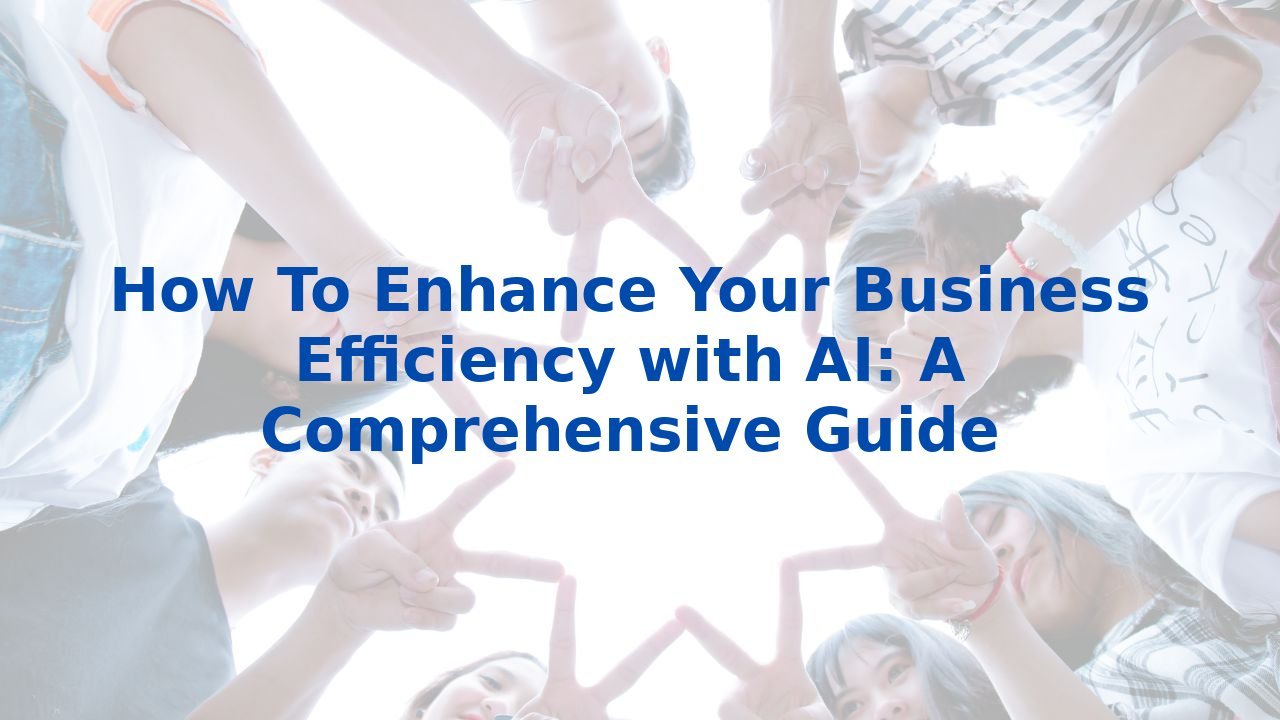How To Enhance Your Business Efficiency with AI: A Comprehensive Guide
Enhancing Business Efficiency with AI: A Comprehensive Guide
Introduction
In today's fast-paced business landscape, efficiency is paramount. Organizations are continually seeking ways to streamline their processes and enhance productivity. Enter artificial intelligence (AI), a transformative force that can revolutionize how businesses operate. This comprehensive guide is designed to explore how AI can elevate various business processes, focusing on automation, decision-making, and customer service.
1. Automating Routine Tasks
Imagine freeing your team from the drudgery of repetitive tasks—a dream made possible through AI. One of the standout features of AI is its ability to automate routine processes, leading to significant time savings and a marked reduction in human error. For example, intelligent document processing (IDP) harnesses AI to extract data from documents automatically, reducing manual input significantly. In industries overwhelmed with paperwork, such as finance and healthcare, this automated efficiency is a game-changer.
2. Improving Decision Making
In a world awash with data, making informed decisions can feel overwhelming. AI steps in here, serving as a magnifying glass that reveals hidden insights. By analyzing massive datasets, AI algorithms can find trends and patterns that might escape human notice. In sales and marketing, for instance, AI can predict customer behavior and recommend optimal pricing strategies, allowing organizations to make data-driven decisions that propel them forward.
3. Enhancing Customer Service
Your customers' experience defines your brand. AI can significantly enhance customer service by streamlining interactions. Chatbots and virtual assistants can handle routine inquiries, providing quick answers and freeing up human representatives to tackle more complex issues. Moreover, AI can sift through customer feedback and identify pain points, allowing businesses to refine their approach continually. With AI in their corner, organizations can ensure a superior and consistently improved customer experience.
4. Optimizing Sales and Marketing
In the realm of sales and marketing, AI is invaluable. It enables retailers to effectively manage inventory, design store layouts, and forecast customer demand with precision. Driven by data, AI tools can analyze past sales performance to determine which products warrant promotion and identify more effective targeting strategies for advertisements. By integrating AI into their sales and marketing processes, businesses can operate with heightened efficiency and unlock revenue potential.
5. Improving Product Development Processes
AI has also earned its stripes in product development. Generative design software employs AI to explore a multitude of design options, drastically cutting down the time and resources typically required for prototyping. This ability allows teams to innovate faster, respond to market needs swiftly, and ultimately deliver products that resonate with consumers.
6. Enhancing Manufacturing Processes
The manufacturing sector is not left out of AI's embrace. Collaborative robots, or cobots, work in tandem with human counterparts, equipped with machine vision to adapt their actions based on the presence and activity of people. This synergy significantly enhances workflow efficiency and safety, transforming production environments into dynamic ecosystems where output is maximized without compromising human welfare.
7. Refining Recruitment
Recruitment, the bedrock of every talented organization, can be significantly optimized through AI. By analyzing job applications and candidate data, AI can swiftly identify the best candidates, cutting down the time and effort conventional screening demands. This effectiveness allows HR professionals to channel their energies toward fostering relationships and building strong, dynamic teams.
Benefits of AI Training for Employees
While AI holds remarkable promise, its efficacy hinges on how well your team understands and utilizes these tools. Providing AI training is essential for empowering employees to leverage this technology effectively. Training programs should focus on helping team members integrate AI into their workflows, maximizing the potential these systems offer. By investing in AI education, organizations can ensure their workforce is equipped to thrive in an AI-enhanced landscape.
Conclusion
The potential of AI to reshape business processes is nothing short of astonishing. From automating mundane tasks to enriching decision-making and customer interaction, AI can significantly elevate organizational efficiency and productivity. As businesses evolve in this age of technology, embracing AI will be key to staying competitive and achieving long-term success. To take the plunge into the future of business, exploring training opportunities is a strategic move.



